Amidst eCommerce platforms, such as Magento vs X-Cart, which one do you suppose is superior?
When setting up a brand new website, picking the right eCommerce solution is crucial. But, merchants may feel trouble in this selection process because of the diversity of eCommerce solutions. In this blog, we will evaluate two notable platforms, Magento and X-Cart, so that you can have an overall understanding of which player fits your business.
Magento vs X-Cart Overview
Table of Contents
Before comparing X-Cart vs Magento, we will provide you with some general information about these two eCommerce platforms.
About Magento
Magento is an eCommerce software that is composed in PHP and constructed on Zend Framework. Varien Inc., a US software company, started the journey of Magento in 2007 but officially released it in March 2008, with the primary motivation of supporting online merchants in building their virtual stores. In 2018, Adobe Systems Inc. acquired Magento. This acquisition has brought countless benefits to both sides and has opened more opportunities for Magento to target large enterprises.
After years of enlargement, Magento is now the leading solution in the eCommerce world, with the number of Magento webshops reaching over 750,000. Moreover, numerous first-class and well-known businesses have trusted Magento, namely Big Bus Tour, Aldo, Forever New, ASUS, Rossignol, Paul Smith, Canon, Ford, Helly Hansen, and so much more.
To satisfy the needs of different target segments, Magento provides two different editions, including Magento Community Edition and Magento Enterprise Edition.
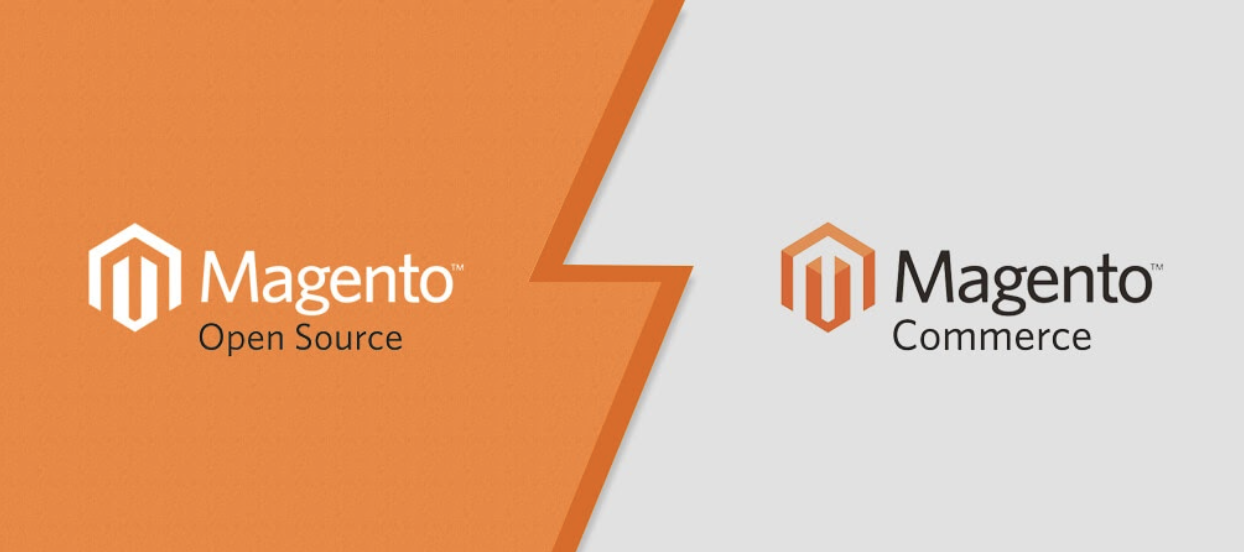
Magento Open Source vs. Magento Commerce
- Magento Open Source does not require any payment to download. It only offers core and essential features to build an eCommerce Store.
- Magento Commerce has both basic and significantly more advanced features that can set up complex eCommerce stores.
You should dig deep into the difference between Magento Open Source vs Adobe Commerce to choose the best fit edition for your eCommerce business.
About X-Cart
Creative Technologies LLC, a Russia-based website development company, formally launched X-Cart in 2000. As same as Magento, X-Cart is an eCommerce platform that is compiled in PHP. X-Cart is the first shopping cart software in the world and is one of the most long-established platforms. For more than two decades, X-Cart has served and powered numerous websites. As of April 2021, there are over 35,000 online shops globally that use X-Cart.
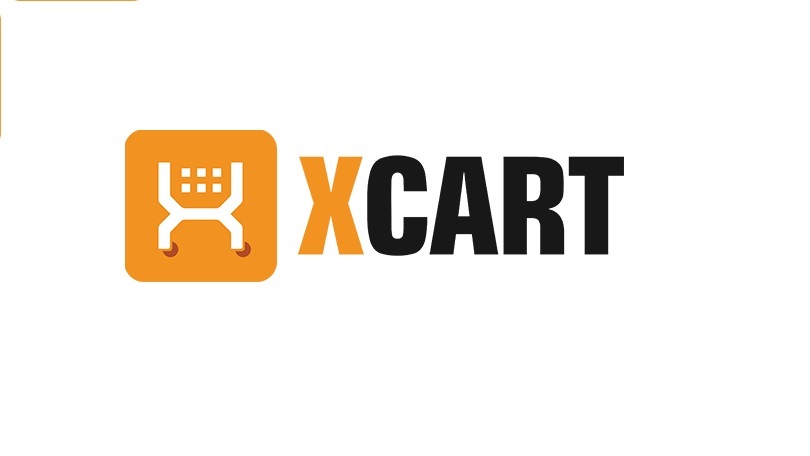
X-Cart eCommerce platform
Apart from the free version, X-Cart offers flexible pricing plans that suit businesses of all sizes, including Business, Multivendor, and Ultimate. The higher the plan you pay for, the better functionalities you get.
Besides, our B2B experts have compiled a comprehensive comparison chart of the Top 3 best eCommerce platforms – Magento vs Shopify vs BigCommerce.
Magento vs X-Cart: 9 Key Points Comparison
Although Magento and X-Cart are both eCommerce platforms, these two solutions are different in various aspects, such as Support, price, scalability, etc. Let’s find out all the similarities and differences through the comprehensive analysis below!
#1. Key Features and Functionalities
The first aspect when considering Magento vs. X-Cart is critical features and functionalities. Both Magento and X-Cart were designed with the same core purposes, but each platform has its slightly distinctive features.
From the past to the present, Magento has been widely known as a powerful eCommerce platform with diverse out-of-the-box features. Thanks to the flexible ability to manage multiple storefronts, payment gateways, etc., Magento assists businesses of all sizes to deliver uninterrupted purchasing experiences to their customers. In addition, there are numerous of Magento’s robust features of the Enterprise Edition that are worth mentioning, including but not limited to:
- PCI Compliant
- Multi-Source Inventory
- Flexible Pricing Tools
- Product Recommendations
- Visual Merchandising
- Automated target rules
- Flexible pricing tools
- Business Intelligence Dashboard (average order value, retention rates, etc.)
Moreover, besides having exceptional B2C features, Magento is an outstanding platform for helping B2B businesses with exemplary B2B functionalities, such as:
- Purchase orders
- Line of credits
- Quote functionalities
- Quick ordering process
- Expedia restocking
- Large orders handling
- Shared catalog
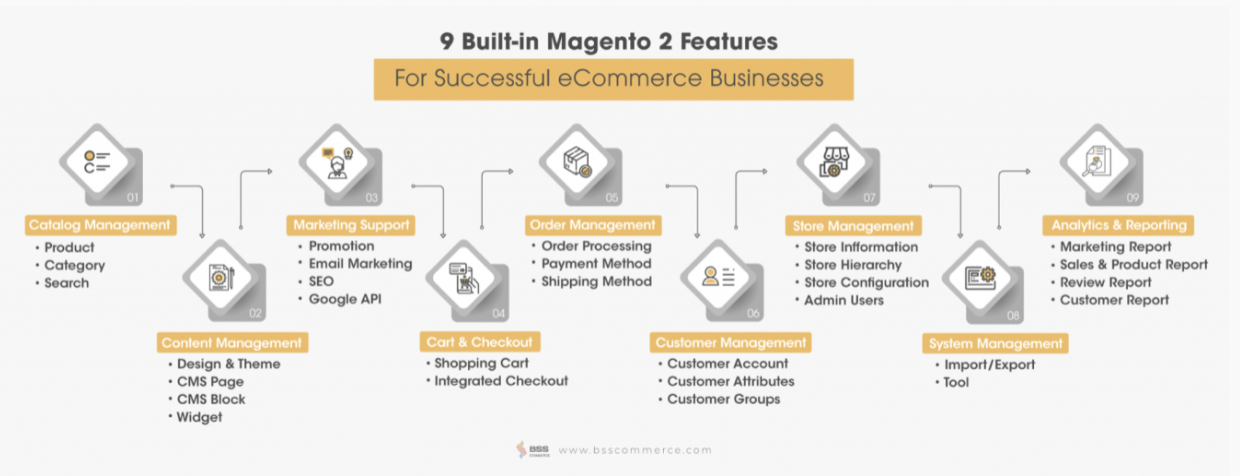
Magento 2 Features
>>> LOOK INTO Magento 2 Tutorial to find more updated information.
About X-Cart, this platform also has many remarkable features, not too much ferior to Magento:
- Storefront user experience: real-time smart search, intuitive drag & drop interface, etc
- Buying journey: 120+ payment providers, one-step or multistep checkout, etc
- Security: fraud prevention, recurring payments, etc
- Sell everywhere: native multi-vendor, separate vendor storefront & dashboard, etc
- Omni-Channel eCommerce: Brick-and-mortar stores, seamless inventory updates, single admin hub, etc
- Cross Border Commerce: Multi-currency transactions, automated taxes, etc
#2. Ease of Use
Ease of Use is another element you need to contemplate when contrasting Magento vs X-Cart. There is no doubt that Magento is not suitable for website owners who are not IT literate or have at least a rudimentary comprehension of technical skills because the website-building process needs coding. In this case, users can authorize that complicated process to a top-class Magento partner like BSS Commerce. We are proud to be the first Southeast Asia partner of Magento with 11+ years of experience in the eCommerce industry
In contrast, X-Cart is easier to use in terms of the user-friendly side and fits anybody, even beginners who do not have much experience with HTML programming, in designing and running eCommerce stores.
#3. Pricing
Pricing is another critical element when comparing X-Cart vs Magento as everything related to the financial aspect is essential to a business. To construct and run a practical eCommerce store, businesses have to pay several expenses, namely hosting fees, extension fees, and so much more.
Although only has two editions, Magento comes with three pricing plans. As revealed previously, downloading and using Magento Open Source is free. However, the yearly license price for Magento starts at $22,000 and rises to $40,000 for Magento Commerce and Magento Commerce Cloud. The fee is determined by the average order value and annual gross merchandise volume of a business. For detailed pricing, you can have a look at the table below.
Pricing plans for Magento 2 Enterprise Edition and Cloud Edition
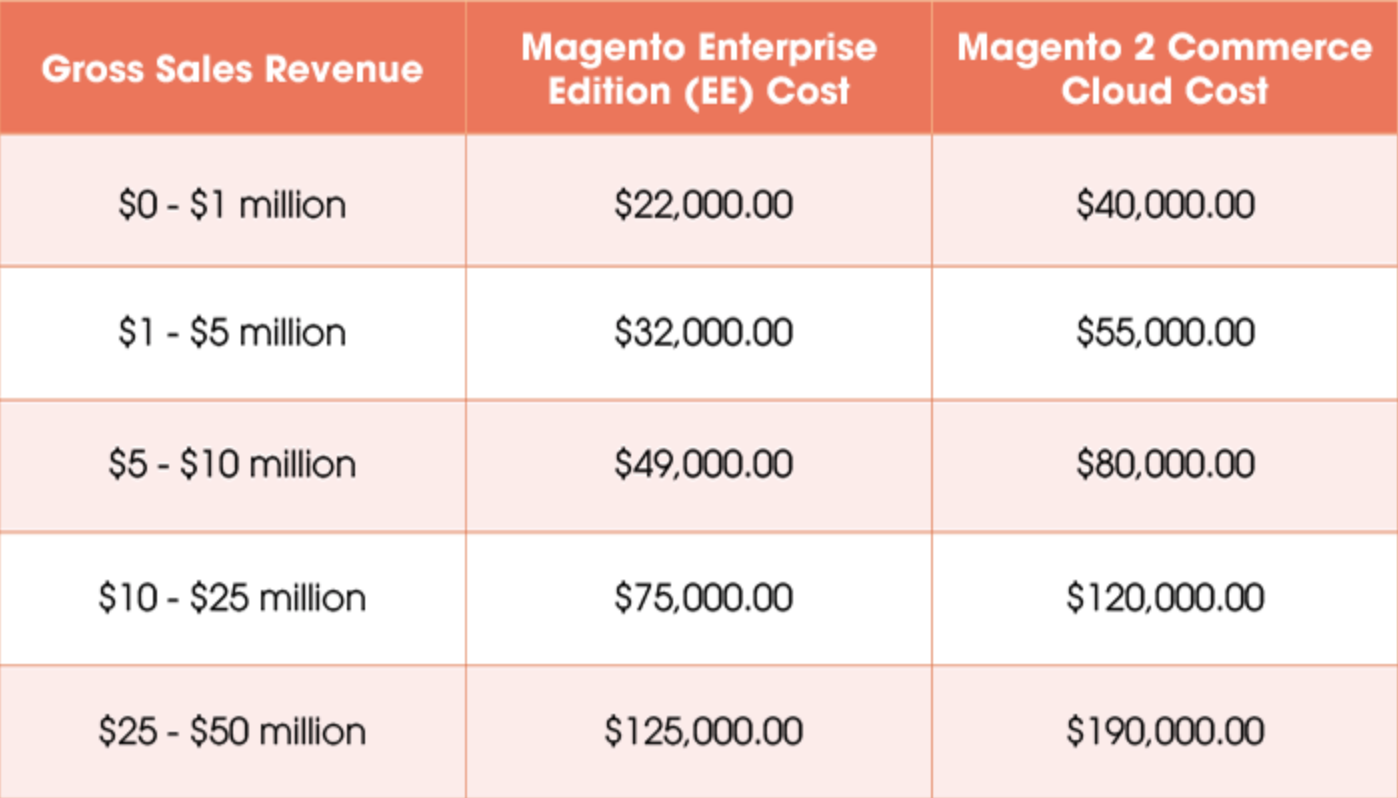
Concerning X-Cart, this platform sells its services with a license-based system. The X-Cart platform pricing starts at $199 per month with no hidden fees or per-transaction charges. This plan includes all the essential features to build an online store of any size and budget. For additional functionality and store customization options, please contact the platform.
It is undeniable that the fee to operate a virtual shop on X-Cart is much lower than on Magento. However, the price of Magento is still reasonable as Magento’s users can make the most of premium and robust features.
>>> LEARN MORE about All Costs to Build A Magento Website!
#4. SEO & Marketing
The next aspect that you need to assess between Magento vs XCart is SEO and Marketing. Without these elements, your business cannot stay strong in this digital era with countless competitors.
As a sturdy eCommerce solution, Magento does a pre-eminent job in providing built-in SEO & Marketing features that help its clients’ websites be more visible on search engines like Google, Bing, Yandex, etc, to target more customers and increase profits. Regarding SEO, some default features include personalized URLs, image optimization, meta tags, etc. Moreover, Magento offers various sophisticated Marketing functionalities, such as Related Products Rules, Gift Card Accounts, Private Sales, Newsletter Subscribers, Email Reminders, User Content, and Customer Engagement, to name a few.
As same as Magento, X-Cart also provides excellent SEO and Marketing management with functional tools such as Multi-Channel Marketing, Loyalty programs, 301 Direct, SEO-friendly URLs, etc. In addition, X-Cart provides deeply analyzed reports (integrated with Google Analytics) that help businesses understand their customers and sales. Unfortunately, X-Cart does not have blogging features that may affect SEO performance badly and its email marketing tools.
#5. Scalability
For businesses that have to scale and expand plans, thinking about the scalability of XCart vs Magento is necessary. Scalability reveals how productively and excellently a webshop works while managing enormous inventory and a spike in traffic volume on worldwide shopping days like Black Friday, November 11, etc.
As a robust eCommerce solution, Magento has all the proficiencies and potentialities to handle 50,000 visits per hour and a great inventory system that is able to hold on to innumerable products altogether. Therefore, Magento is suitable for medium to large businesses that have ambitious flourishing, and expanding intentions.
Like Magento, X-Cart is competent in controlling over 1 million SKUs effortlessly. Also, X-Cart is exceedingly scalable if online merchants pay enough attention to some elements, such as plugins, hosting, etc.
#6. Speed & Performance
It is compulsory to evaluate Magento vs X-Cart’s speed & performance because the performance of an online store plays a dominant role in achieving customer satisfaction. According to several reports, more than 70% of online buyers will never return to a website if they perceive that the website loading speed is slow-going, so every second squandered will cause a loss of potential customers. Furthermore, unlike other hosted platforms that ensure high-speed running standards, Magento and X-Cart are self-hosted, so the websites’ loading speed is based on hosting places and other opponents, including the number of extensions, compressed images, theme design, etc.
If you want to have a Magento webshop but are worried about optimizing the loading speed, consider the Magento Speed Optimization service of BSS Commerce.
#7. Security
The next thing you should review between Magento and X-Cart is Security because your online store will need to be protected from cyber attacks like privacy, sensitive data and personal identity theft, fraud and financial scams, and other threats. If your eCommerce site is the target of cyber endangers, you will have to pay a considerable cost (reputational damage, settle claims, etc).
Whereas online merchants who use Magento Enterprise Edition can advantageously experience superlative built-in features, users of Magento Community Edition will need to download security extensions. Alternatively, if website owners do not want to install security add-ons, Magento frequently issues security patches to assist its virtual stores in preventing any likely cybercrimes. This updating procedure is pretty tricky as it necessitates coding expertise; therefore webshop owners could get help from third-party partners.
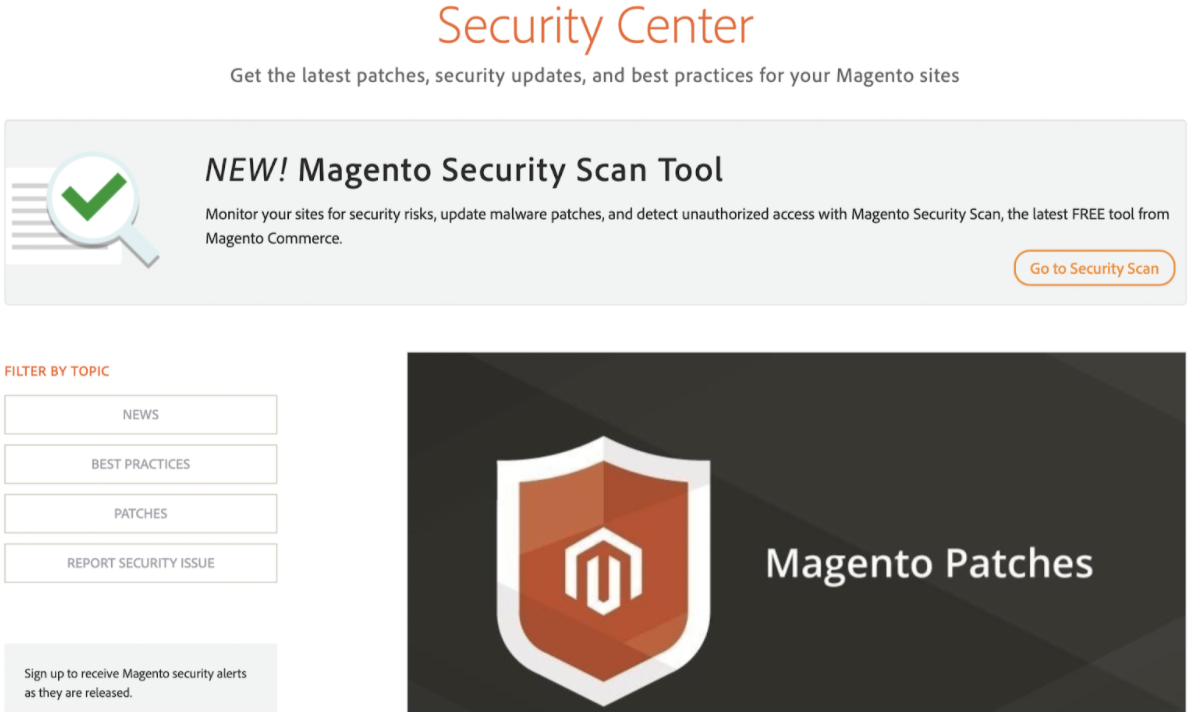
Magento’s Security Center (Updating Patches)
Simultaneously, X-Cart’s developers also supply security patches that solve security holes and offer several extensions for users to install.
#8. Support
Evaluating Magento vs X-Cart regarding support is unavoidable.
Magento has several excellent customer service methods to give its users the best assistance. Users of Magento Community Edition and Enterprise Edition can receive two different degrees concerning support, such as ‘You Get What You Pay For’. Online merchants who use Magento Open Source only obtain technical guidance from:
- Formal sources such as Magento DevDoc, Magento Help Center
- Free community forums like Magento Forum, Magesolution Community, etc
- Authorized associates of Magento
As opposed, if Magento Commerce (Cloud)’s customers have any questions or face any difficulties, they can enjoy thoughtful aid via email or live chat.
If you are struggling at any part of the website building process, CHECK OUT Magento Website Development Service of BSS Commerce.
About X-Cart, besides having email (help desk), forum, and 24/7 live representative support like Magento, this platform also furnishes phone support to answer all concerns of users.
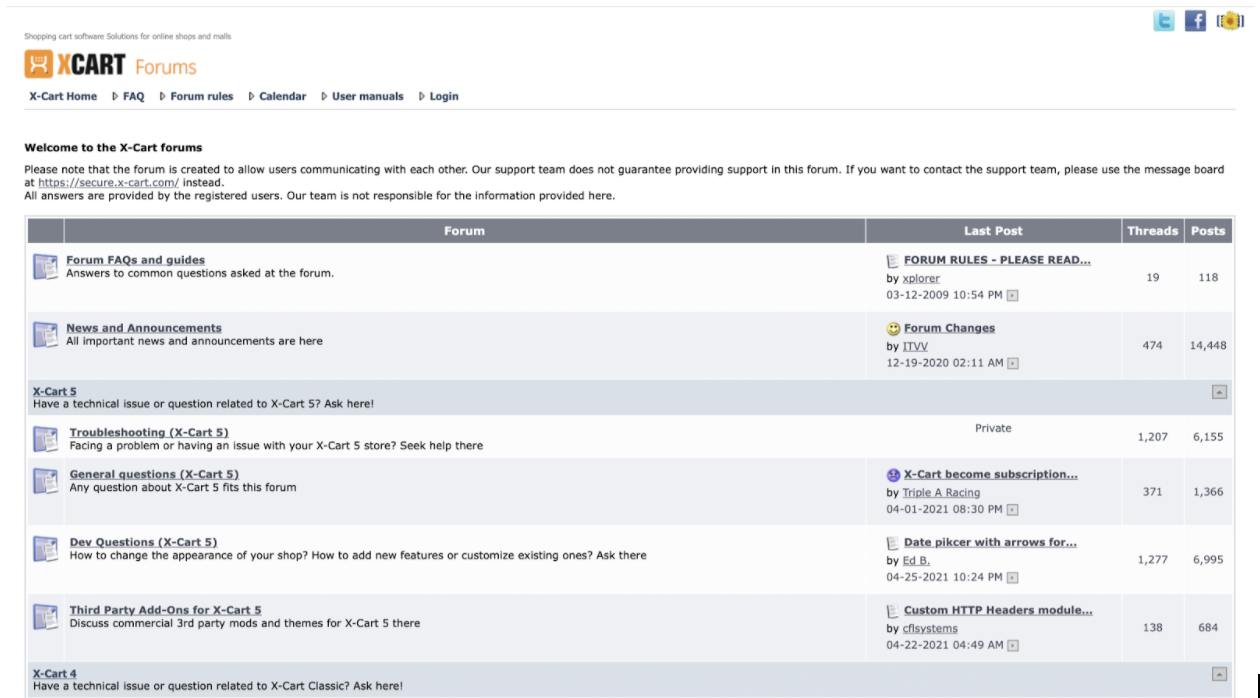
X-Cart Support Forum
#9. Extensions and Plugins
The last thing you need to assess is Extensions and Plugins. Every eCommerce solution still has imperfections in some aspects, so people may need to install Extensions to compensate for these limitations. Luckily, both Magento and X-Cart’s marketplaces have countless extensions that can support to heighten the proficiencies and functionalities of online shops.
In the matter of Extensions’ numbers of Magento vs X-Cart, it is clear that Magento has more. In Magento Marketplace, there are over 4000 extensions, which are divided into different categorizations by topic, including Customer Support, Marketing, Shipping & Fulfillment, Accounting & Finance, and so much more. All of these integrations always have excellent quality because before appearing on the Marketplace, each one was to be assessed carefully to ensure the standard. In addition, customers can also buy Magento add-ons through third-party developers and partners like BSS’s marketplace.
About X-Cart, although this solution has fewer add-ons compared to Magento, the Marketplace of X-Cart has more categories, such as Search & Navigation, Shipping Solutions, User experience, Price modifiers, etc, which bring the most straightforward and exemplary way for users to find the suitable integrations for their online businesses.
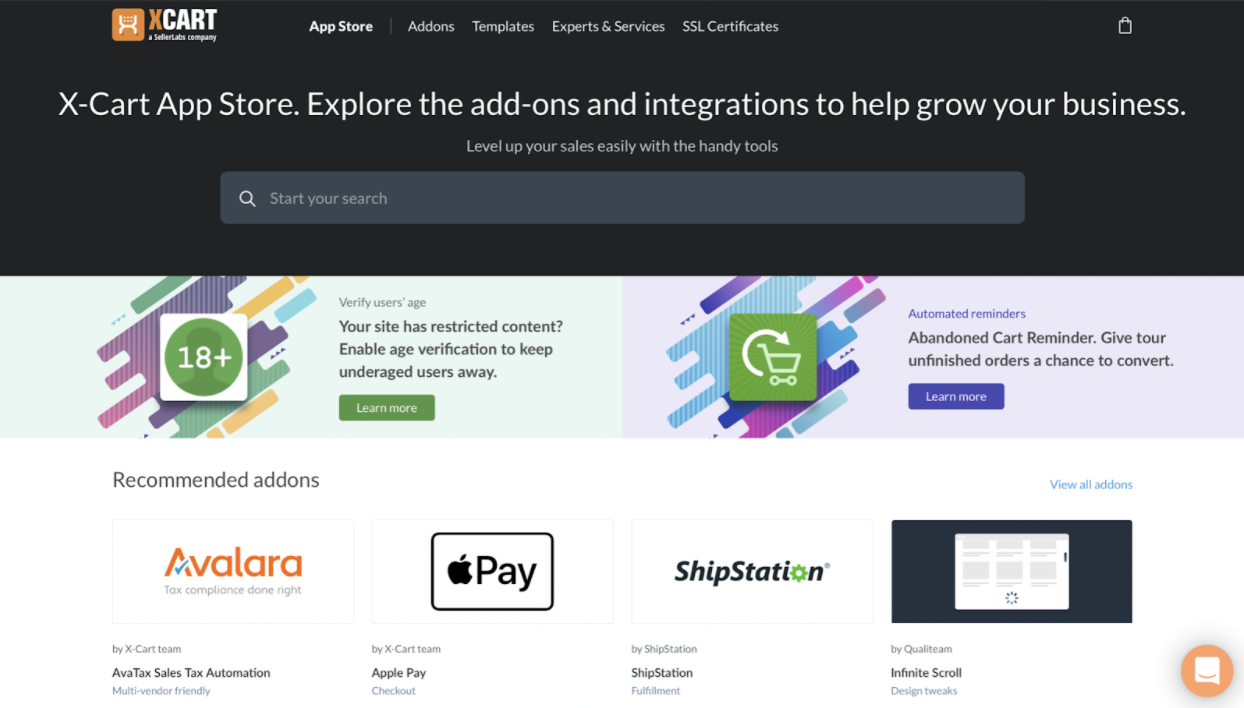
X-Cart App Store
Apart from Magento vs. X-Cart comparison, if you want to widen your choice, you can take a look at other comparisons here:
- Magento vs WordPress
- Magento vs Shopify
- Magento vs BigCommerce
- Magento vs OpenCart
- Magento vs NopCommerce
- Magento vs. Sitecore
Magento vs X-Cart: Which Platform Is More Comprehensive for ECommerce Shops?
In conclusion, it is complicated to determine, Magento vs X-Cart, which platform is better and which one you should use from the above comparisons. To make the right decision, you should cautiously consider the following aspects: your business size, the scope of enlargement, financial capability, etc. For example, if your business has a tight budget and does not need any premium features, X-Cart may be the one you are looking for. But, on the other hand, Magento is the perfect eCommerce solution if you want your business to grow, expand rapidly, and use a platform with various state-of-the-art built-in features with an exemplary inventory management system.
Additionally, read this article to make the best choice for your eCommerce store: Top 10+ Magento Alternatives You Need to Know


